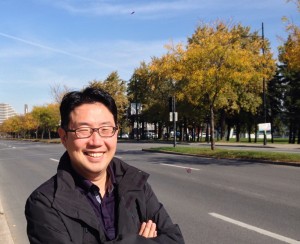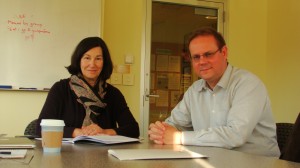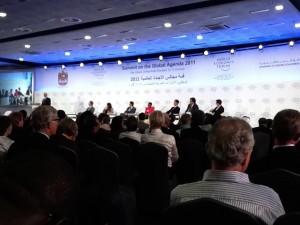 Seok-Jin Eom, associate professor at Seoul National University and former NCDG fellow, joined Jane Fountain and international colleagues as part of an international panel titled “Transformation of Public Policy and Governance in the Digital Age,” at the World Social Science Forum, October 13-15, at the Palais des congrès de Montréal Canada. The conference theme was “social transformation in the digital age.”
Seok-Jin Eom, associate professor at Seoul National University and former NCDG fellow, joined Jane Fountain and international colleagues as part of an international panel titled “Transformation of Public Policy and Governance in the Digital Age,” at the World Social Science Forum, October 13-15, at the Palais des congrès de Montréal Canada. The conference theme was “social transformation in the digital age.”
The international panel was organized by the Korean Social Science Research Council and the Korean National Commission for UNESCO. It brought together scholars from several major countries to cast a critical look at public policy and governance, one of the important social transformations in the digital age, in a comparative setting. To this end, the KOSSREC invited internationally recognized scholars on the subject from four countries including China, Japan, Korea, and the USA.
The panel was coordinated by Yong-duck Jung, President of the Korean Social Science Research Council and Professor, Seoul National University. Invited scholars and their papers included:
Professors Seok-Jin Eom and Yong-duck Jung (Seoul National University), “Administrative Information Sharing and its Impacts on Governance in Korea”
Professor Hiroshi Shiratori (Hosei University), “Transformation of Public Policy and Governance in the Digital Age: The Case of Japan”
Professor Sun Yu (School of Government, Beijing Normal University) and Dang Shengcui, Fang Bin, and Zhao Qiuyan (China Academy of Social Management, Beijing Normal University, Beijing, China), “Public Access to Administrative Information and Participatory Governance in the Digital Age: Findings from China’s Survey”
Professor Jane Fountain (National Center for Digital Government and University of Massachusetts Amherst) “Virtual Agencies: Cross-Agency Collaboration in the U.S. Federal Government”
The invited scholars presented their country experiences with an eye toward finding common themes cross-nationally. The panel discussion focused on the ways and the results in which digital technologies are being used for public policy development and innovation in governance. A key theme that emerged from the panel presentations and discussion is the centrality of cross-agency collaboration and its importance for innovation in government globally.


 CIDE Professor and NCDG Faculty Affiliate, J. Ramon Gil-Garcia has published Enacting Electronic Government Success: An Integrative Study of Government-wide Websites, Organizational Capabilities, and Institutions (Springer 2012). Previews of chapters are available on the
CIDE Professor and NCDG Faculty Affiliate, J. Ramon Gil-Garcia has published Enacting Electronic Government Success: An Integrative Study of Government-wide Websites, Organizational Capabilities, and Institutions (Springer 2012). Previews of chapters are available on the 


 Toks Oyedemi, a doctoral candidate in the Department of Communication at the University of Massachusetts Amherst, has received a 2010 Student Research Grant from the National Center for Digital Government (NCDG).The award will help Oyedemi conduct doctoral field research on the pattern and quality of Internet access and the role of technology in social change in South Africa.
Toks Oyedemi, a doctoral candidate in the Department of Communication at the University of Massachusetts Amherst, has received a 2010 Student Research Grant from the National Center for Digital Government (NCDG).The award will help Oyedemi conduct doctoral field research on the pattern and quality of Internet access and the role of technology in social change in South Africa.